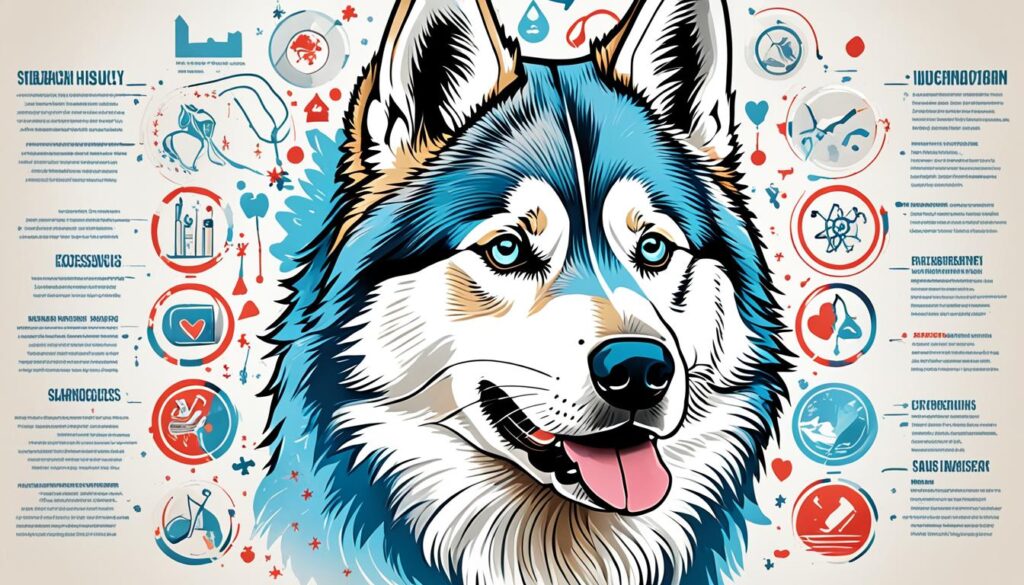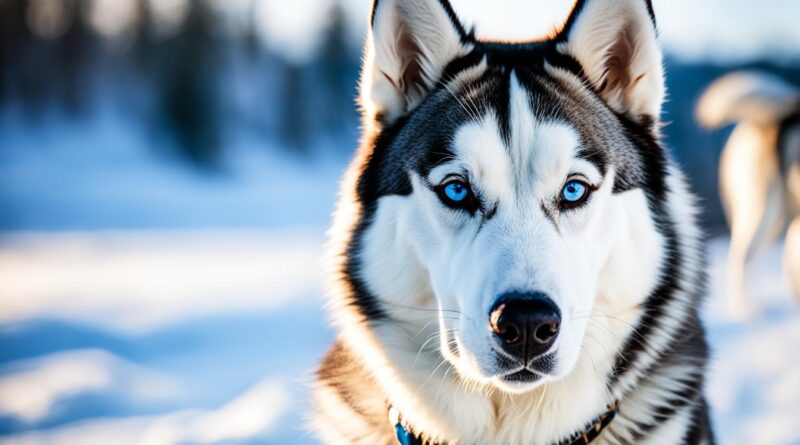Siberian Husky Lifespan: How Long Do They Live?
Have you ever wondered about the lifespan of a Siberian Husky? These beautiful and energetic dogs are known for their striking appearance and adventurous spirit. If you’re considering adding a Siberian Husky to your family, it’s important to understand how long they typically live and the factors that can influence their longevity.
The average lifespan of a Siberian Husky is around 12 to 15 years, which is longer than many other dog breeds of similar size. However, it’s important to note that individual lifespans can vary based on several factors.
Responsible breeding practices play a significant role in the lifespan of Siberian Huskies. Breeders who prioritize genetic health screenings and focus on producing healthy offspring can help reduce the likelihood of inherited health issues that may impact a dog’s longevity.
Proper nutrition is also essential for extending a Siberian Husky’s lifespan. A balanced diet that provides all the essential nutrients and vitamins can help support their overall health and well-being.
Regular exercise is another key factor in promoting a longer lifespan for Siberian Huskies. These active dogs need daily exercise to keep them physically fit and mentally stimulated. Whether it’s going for long walks, playing fetch, or engaging in other activities, providing ample exercise opportunities can contribute to their longevity.
Additionally, regular veterinary checkups are crucial for maintaining your Siberian Husky’s health. Routine examinations and vaccinations can help detect and address any potential health concerns early on, increasing their chances of a longer and healthier life.
While Siberian Huskies are generally healthy dogs, they are prone to certain health issues that owners should be aware of. Common health problems in this breed include hip dysplasia, cataracts, and progressive retinal atrophy. Genetic health screenings can help identify these issues early, enabling appropriate management and treatment.
To care for the longevity of your Siberian Husky, focus on providing them with a balanced diet, regular exercise, and routine veterinary care. Lastly, maintaining a healthy weight is fundamental, as obesity can significantly reduce a dog’s lifespan.
Key Takeaways:
- The average lifespan of a Siberian Husky is around 12 to 15 years.
- Responsible breeding practices and genetic health screenings can contribute to a longer lifespan.
- A balanced diet and regular exercise are essential for promoting a Siberian Husky’s longevity.
- Regular veterinary checkups can help detect and address potential health issues early on.
- Siberian Huskies are prone to certain health issues, including hip dysplasia and eye problems.
Factors Affecting Siberian Husky Lifespan
The lifespan of a Siberian Husky can be influenced by various factors. Responsible breeding practices, genetics, diet, exercise, and regular vet checkups all play a role in determining the longevity of these magnificent dogs.
Responsible Breeding: Responsible breeders prioritize the health and well-being of their dogs. They conduct genetic health screenings to identify any potential inherited health issues. By selecting healthy parents with no genetic health problems, breeders can reduce the risk of passing on these issues to the offspring.
Diet: A balanced diet is crucial for the overall health and longevity of Siberian Huskies. Providing them with nutritious whole foods that meet their nutritional requirements is essential. Feeding high-quality dog food that is appropriate for their age, size, and activity level can help optimize their health and increase their lifespan.
Exercise: Regular exercise is essential for keeping Siberian Huskies fit and active. These energetic dogs have a natural inclination for physical activity, and a lack of exercise can lead to weight gain, behavioral issues, and overall health problems. Engaging in activities such as daily walks, runs, or playtime can help maintain their physical and mental well-being.
Regular Vet Checkups: Regular visits to the veterinarian are crucial for detecting and addressing any health issues early on. Routine checkups, vaccinations, and preventative care can help identify potential problems and provide the necessary treatments or interventions. By staying proactive about their healthcare, owners can promote a longer and healthier life for their Siberian Huskies.
Incorporating these factors into the care and management of Siberian Huskies can contribute to their overall well-being and extend their lifespan. By ensuring responsible breeding practices, providing a balanced diet, encouraging regular exercise, and scheduling regular vet checkups, owners can help their beloved Huskies live a long and fulfilling life.
Common Health Issues in Siberian Huskies
While Siberian Huskies are generally healthy dogs, there are certain health issues that are more common in this breed. It is important for owners to be aware of these common health problems and take appropriate measures to prevent and manage them. Regular genetic health screenings can play a crucial role in identifying potential issues early on, allowing for timely intervention and treatment.
Hip Dysplasia
Hip dysplasia is a condition that affects the hip joint’s proper development. It can cause discomfort, lameness, and even arthritis, leading to reduced mobility and quality of life for the affected Husky. Regular exercise, maintaining a healthy weight, and providing joint supplements as recommended by a veterinarian can help manage the symptoms of hip dysplasia and slow down its progression.
Eye Problems
Siberian Huskies are prone to various eye problems that can affect their vision and overall well-being. Some common eye conditions in Huskies include cataracts, progressive retinal atrophy, and corneal dystrophy. Cataracts cause clouding of the lens, leading to impaired vision. Progressive retinal atrophy is a degenerative condition that results in gradual vision loss. Corneal dystrophy affects the transparent front part of the eye, causing blurred vision and discomfort.
Early detection of eye problems is crucial for effective management. Regular veterinary examinations and genetic health screenings can help identify these issues at their early stages, allowing for appropriate treatment or surgical intervention if necessary. Providing a clean and safe environment to minimize eye injuries is also important.

Genetic Health Screenings
Genetic health screenings are highly recommended for Siberian Huskies to identify potential inherited health issues. These screenings involve testing for specific genetic markers associated with various health conditions. By conducting these screenings, breeders and owners can make informed decisions about breeding pairs and take appropriate preventive measures to ensure the health and well-being of future generations of Huskies.
Regular genetic health screenings can also help identify potential health issues in individual dogs. Early detection allows for proactive management and timely intervention, which can significantly improve the quality of life for affected Huskies.
Common Health Issues in Siberian Huskies
| Health Issue | Description | Prevention and Management |
|---|---|---|
| Hip Dysplasia | Affects hip joint development; can cause lameness and arthritis | Regular exercise, weight management, joint supplements |
| Cataracts | Clouding of the eye’s lens, leading to impaired vision | Early detection, regular eye examinations, surgical intervention if necessary |
| Progressive Retinal Atrophy | Gradual degeneration of the retina, resulting in vision loss | Early detection, genetic health screenings, supportive care |
| Corneal Dystrophy | Affects the transparent front part of the eye, causing blurred vision | Early detection, regular vet checkups, treatment as recommended by a veterinarian |
It is important for Siberian Husky owners to educate themselves about these common health issues and take proactive steps to ensure the well-being of their furry companions. Regular veterinary care, including genetic health screenings, can help identify potential issues early on, enabling timely intervention and appropriate management strategies.
Caring for the Longevity of Siberian Huskies
To enhance the longevity of a Siberian Husky, it is crucial to provide them with comprehensive care that addresses their specific needs. By focusing on their diet, exercise, regular vet checkups, and weight management, you can help ensure a long and healthy life for your beloved Husky.
1. Balanced Diet
A balanced diet plays a crucial role in maintaining the overall health and longevity of your Siberian Husky. Providing them with high-quality dog food that is rich in essential nutrients, vitamins, and minerals is essential. Make sure to choose a well-rounded diet that meets their specific dietary requirements, considering their age, activity level, and any specific health concerns they may have. You may also consider consulting with a veterinarian or a professional dog nutritionist to create a customized diet plan for your Husky.
2. Regular Exercise
Regular exercise is not only important for keeping your Siberian Husky physically fit but also for providing them with mental stimulation. These energetic dogs require daily exercise to satisfy their natural instincts and prevent boredom. Long walks, runs, and engaging activities such as playing fetch or agility training can help keep them active and mentally stimulated. However, it is important to gradually increase their exercise routine and consider their age and health conditions to prevent injuries.
3. Regular Vet Checkups
Regular veterinary checkups are vital for the early detection and prevention of any potential health issues. Schedule routine checkups with a trusted veterinarian who can provide thorough examinations and necessary vaccinations. These checkups also allow your vet to monitor your Husky’s weight, dental health, and overall well-being. Additionally, your vet can provide advice on parasite control, dental care, and any specific health concerns related to the breed.
4. Weight Management
Weight management is a crucial aspect of caring for the longevity of your Siberian Husky. Obesity can lead to a myriad of health problems and significantly decrease their lifespan. Monitor your Husky’s weight regularly and adjust their diet and exercise routine accordingly. If you notice weight gain or loss, it is important to consult with your vet to determine the underlying cause and develop an appropriate weight management plan.
By prioritizing a balanced diet, regular exercise, regular vet checkups, and weight management, you can ensure that your Siberian Husky lives a long and healthy life. Remember to provide them with the love, attention, and care they deserve to enhance their overall well-being.

Conclusion
Siberian Huskies are known for their impressive lifespan, with an average of 12 to 15 years, which exceeds many other breeds of similar size. The factors that play a crucial role in their lifespan include responsible breeding, genetics, diet, exercise, and regular veterinary care.
In order to promote the longevity of your Siberian Husky, it is essential to prioritize their well-being by providing proper care and attention to all these factors. Regular exercise helps to maintain their physical health and mental stimulation, while a balanced diet ensures they receive the necessary nutrients for their overall well-being.
Regular veterinary checkups are a fundamental aspect of ensuring your Husky’s longevity. By staying up to date with vaccinations, preventative medicine, and early detection of any potential health issues, you can address them promptly, improving your Husky’s chances of a longer and healthier life.
By following these guidelines, you can provide the optimal care and attention needed to enjoy many joyful years of companionship with your beloved Siberian Husky. Remember that each Husky is unique, and by acknowledging and catering to their individual needs, you are enhancing their quality of life and ensuring a strong and lasting bond.
FAQ
How long do Siberian Husky dogs live?
The average lifespan of a Siberian Husky is around 12 to 15 years.
What factors can affect the lifespan of a Siberian Husky?
Responsible breeding, genetics, diet, exercise, and regular vet checkups can all influence a Siberian Husky’s lifespan.
What are the common health issues in Siberian Huskies?
Common health issues in Siberian Huskies include hip dysplasia, cataracts, progressive retinal atrophy, and other eye problems. Regular genetic health screenings can help identify and manage these issues.
How can I care for the longevity of my Siberian Husky?
Providing a balanced diet, regular exercise, and regular vet checkups, as well as proper weight management, are all important for caring for the longevity of a Siberian Husky.
Is the lifespan of a Siberian Husky longer than other breeds?
Yes, on average, Siberian Huskies have a longer lifespan compared to many other dog breeds of similar size.


